Unit 10 You're supposed to shake hands.Section B(1a-2e)课件(共33张PPT,内嵌音频)九年级英语全册
文档属性
| 名称 | Unit 10 You're supposed to shake hands.Section B(1a-2e)课件(共33张PPT,内嵌音频)九年级英语全册 |  | |
| 格式 | pptx | ||
| 文件大小 | 5.2MB | ||
| 资源类型 | 教案 | ||
| 版本资源 | 人教新目标(Go for it)版 | ||
| 科目 | 英语 | ||
| 更新时间 | 2024-08-03 15:41:06 | ||
图片预览

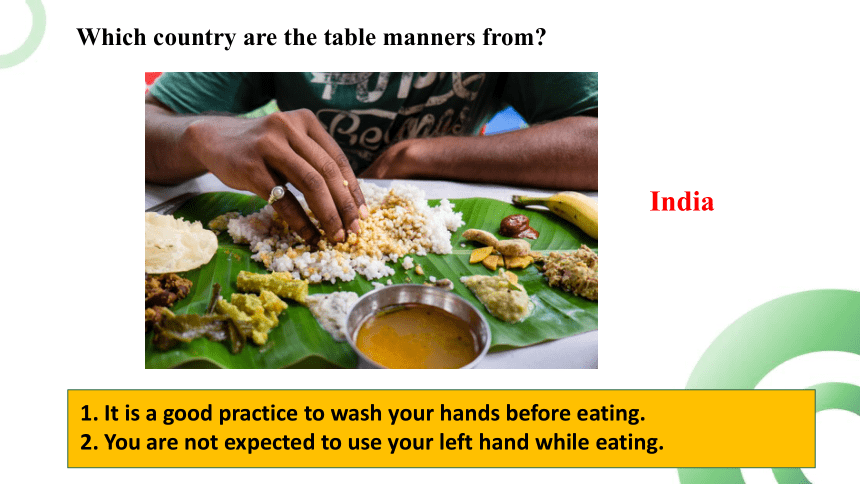

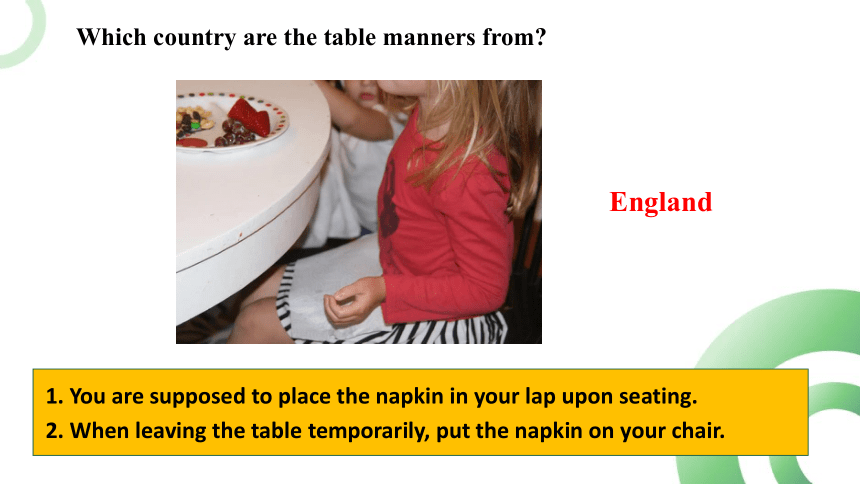
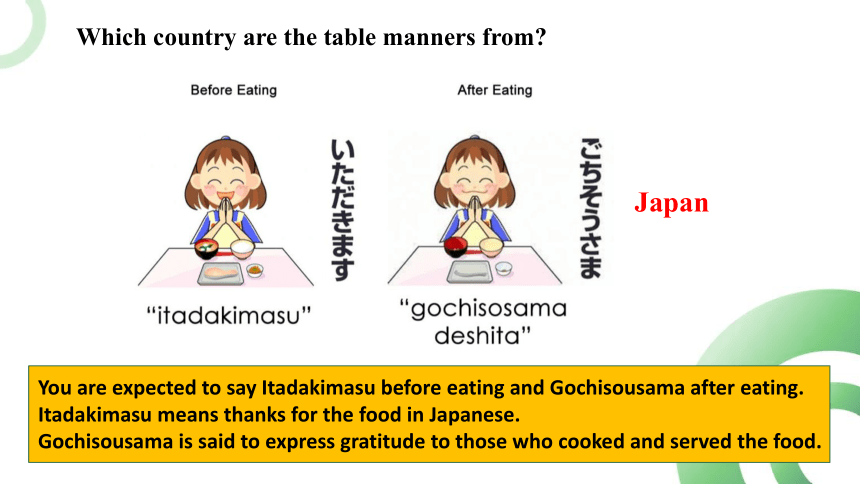
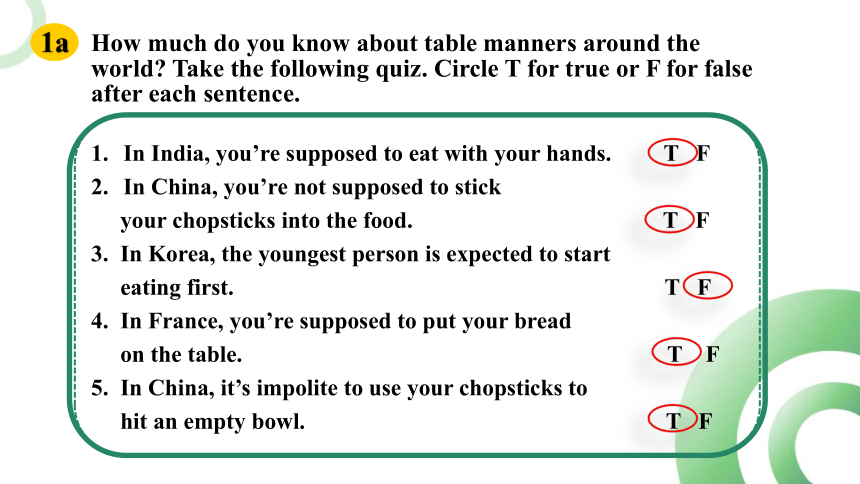
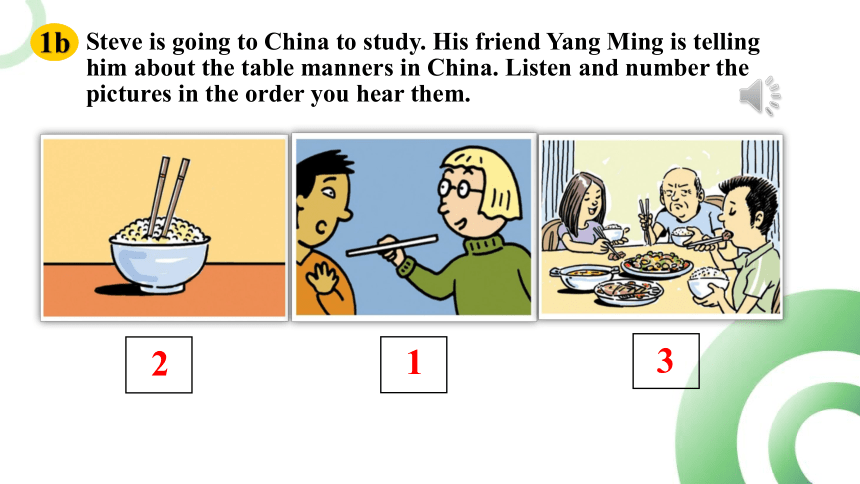
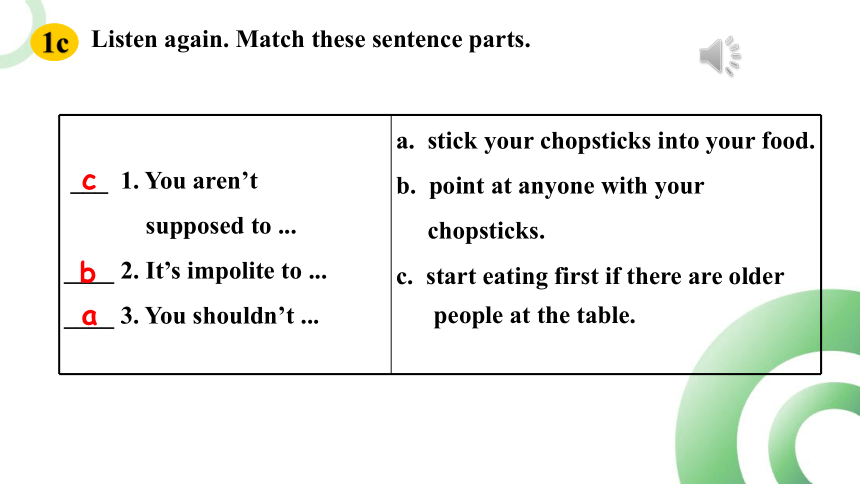
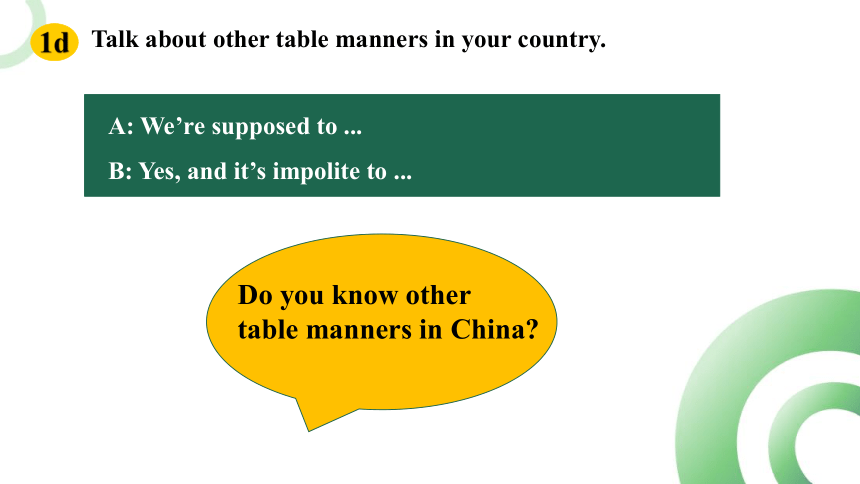
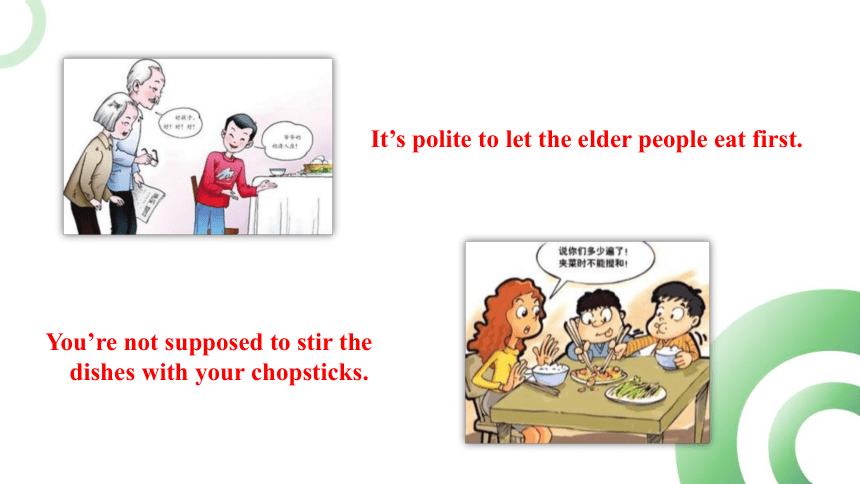
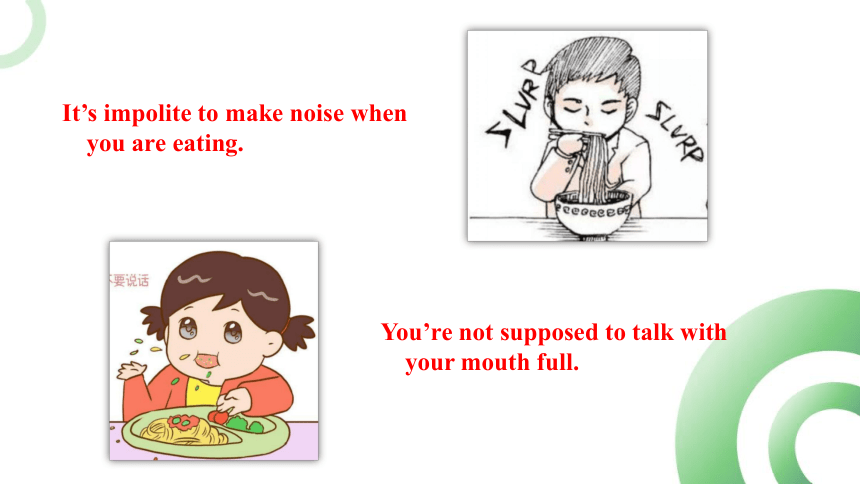
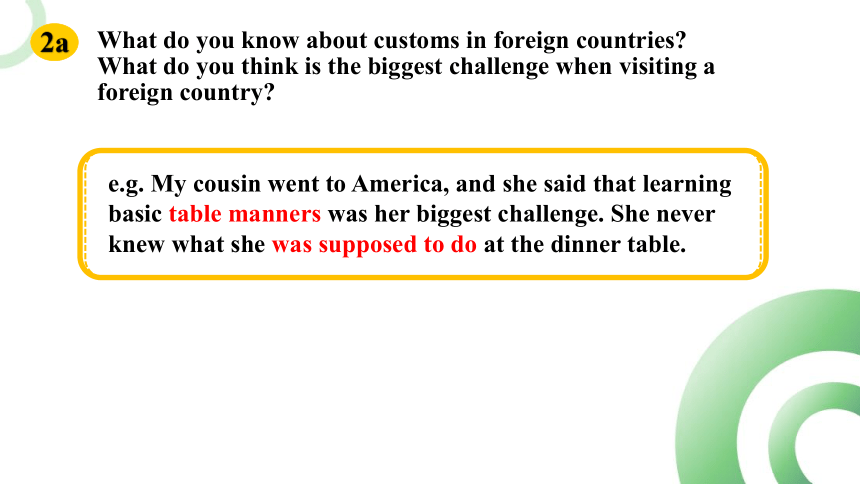
文档简介
(共33张PPT)
Unit10
You’re supposed to shake hands.
Section B(1a–2e)
1. It is a good practice to wash your hands before eating.
2. You are not expected to use your left hand while eating.
Which country are the table manners from
India
1. It is important to keep your hands on the table.
2. Eat with the fork in your left hand, and the knife in the right.
France
Which country are the table manners from
1. You are supposed to place the napkin in your lap upon seating.
2. When leaving the table temporarily, put the napkin on your chair.
England
Which country are the table manners from
You are expected to say Itadakimasu before eating and Gochisousama after eating.
Itadakimasu means thanks for the food in Japanese.
Gochisousama is said to express gratitude to those who cooked and served the food.
Japan
Which country are the table manners from
How much do you know about table manners around the world Take the following quiz. Circle T for true or F for false after each sentence.
1a
In India, you’re supposed to eat with your hands. T F
In China, you’re not supposed to stick
your chopsticks into the food. T F
3. In Korea, the youngest person is expected to start
eating first. T F
4. In France, you’re supposed to put your bread
on the table. T F
5. In China, it’s impolite to use your chopsticks to
hit an empty bowl. T F
Steve is going to China to study. His friend Yang Ming is telling him about the table manners in China. Listen and number the pictures in the order you hear them.
1b
2
1
3
Listen again. Match these sentence parts.
1c
___ 1. You aren’t supposed to ... ____ 2. It’s impolite to ... ____ 3. You shouldn’t ... a. stick your chopsticks into your food.
b. point at anyone with your
chopsticks.
c. start eating first if there are older people at the table.
a
c
b
Talk about other table manners in your country.
1d
A: We’re supposed to ...
B: Yes, and it’s impolite to ...
Do you know other table manners in China
It’s polite to let the elder people eat first.
You’re not supposed to stir the dishes with your chopsticks.
It’s impolite to make noise when you are eating.
You’re not supposed to talk with your mouth full.
What do you know about customs in foreign countries What do you think is the biggest challenge when visiting a foreign country
2a
e.g. My cousin went to America, and she said that learning basic table manners was her biggest challenge. She never knew what she was supposed to do at the dinner table.
阅读指导
阅读过程中对于不认识的生词或短语,要学会根据上下文或已经学过的知识猜测意思。
2) 对于以what, who, which, when, where, how或者why等词引导,就文中某句、某段或某一具体细节进行提问并要求回答,正确理解题干和信息句的意义是关键。速读全文,抓住中心主旨,应尽可能多地捕获信息材料。细读题材,各个击破。阅读时要有较强的针对性。对于捕获到的信息,要做认真分析,仔细推敲,理解透彻,只有这样,针对题目要求才能做到稳、准。
Read the letter and answer the questions.
2b
1. Why is Lin Yue in France
She is an exchange student in France.
2. Does she enjoy staying with her host family How do you know
Yes, she does. Her host family is really nice. They go out of their way to make her feel at home. The grandmother makes Chinese food for her and the granddaughter is kind and talks to her in French to give her practice.
3. How does she feel about making mistakes when she speaks French
It doesn’t worry her as it used to.
Her biggest challenge is how to behave at the dinner table.
4. What is the biggest challenge she is facing
Dear Laura,
Thanks for your message. Yes, I’m having a great time on my student exchange program in France. I was a bit nervous before I arrived here, but there was no reason to be. My host family is really nice. They go out of their way to make me feel at home. The grandmother knows that I miss Chinese food a lot. So she actually learned how to make Chinese food! She also has a teenage granddaughter about my age who is really kind. She always talks to me in French to help me practice.
Find out the main idea of paragraph 1 and 2, then underline the supporting words or phrases.
You wouldn’t believe how quickly my French has improved because of that. I’m very comfortable speaking French now. Although I still make lots of mistakes, it doesn’t worry me as it used to.
My biggest challenge is learning how to behave at the dinner table. As you can imagine(想象), things are very different from the way they are at home. For example, you’re not supposed to put your bread on your plate. You’re supposed to put it on the table! I thought that was pretty strange at first, but now I’m used to it. Another example is that you’re not supposed to eat anything with your hands except bread, not even fruit.
You have to cut it up and eat it with a fork. Another thing is it’s impolite to say that you’re full. If you don’t want any more food, you should just say, “That was delicious.” Also, you’re not supposed to put your elbows on the table. I have to say that I find it difficult to remember everything, but I’m gradually getting used to it. I don’t find French customs so strange anymore.
I’ll write again soon and tell you more about my life in France. Hope you’re having a good school year.
Yours,
Lin Yue
长句解析
1. Thanks for your message.
谢谢你的来信。
thanks for意为“因……而感谢你”,相当于thank you for,强调感谢的
原因。其中,thanks为复数名词,介词for指原因,后接名词、代词或动
名词。
e.g. 谢谢你邀请我。
Thanks/Thank you for inviting me.
2. You wouldn’t believe how quickly my French has improved because of
that.
你简直都想不到就因为这样我的法语提高得有多快。
“You wouldn’t believe..”是一个常用句式,意为“你无法想象…;你都想不
到……”,表示所陈述的事情超出想象之外。与之类似的表达还有
“You would never believe..”或“You would hardly believe..”。
e.g. 你绝对想不到他找到了他丢失的自行车。
You wouldn’t believe that he found his lost bike.
3. My biggest challenge is learning how to behave at the dinner table.
我最大的挑战是学习餐桌礼仪。
“learning how to behave at the dinner table”是动名词短语,用在系动词
后作表语;其中“how to behave at the dinner table”是“疑问词+动词不
定式”结构,用在learning后作动词宾语。
e.g. 我最大的困难就是学习如何记住所有的单词。
My biggest problem is learning how to remember all the words.
4. I have to say that I find it difficult to remember everything,but I’m
gradually getting used to it.
我不得不说,我觉得很难记住所有的东西,但是我正渐渐地习惯它。
“find it+adj.+to do”意为“做……是……的”,it为形式宾语,真正的宾语
为不定式短语。用于此句型的动词还有think,feel等。
e.g. 他觉得听音乐令人很放松。
He finds it very relaxing to listen to music.
Read the sentences and replace the underlined words with the phrases in the box.
2c
1. Making mistakes in French used to make Lin Yue nervous.
2. It was quite hard for her to feel good about speaking French.
3. The host family tried very hard to help Lin Yue.
4. Lin Yue has slowly learned how to be like her French friends.
(something) worry (someone)
be comfortable (doing)
went out of their way
gradually gotten used to being
(something) worry (someone) be comfortable (doing) went out of their way gradually gotten used to being
Fill in the blanks with the appropriate forms of the words in the box.
challenge not…anymore behave except
go out of one’s way actually get used to
be different from be comfortable exchange
Lin Yue is having a great time on her student _________ program in France. Her host family _________________ to make her feel at home.
The grandmother ________ learned how to make Chinese food for her.
The granddaughter is so kind that she helps her practice French. So she ________________ speaking French now.
exchange
go out of their way
actually
is comfortable
challenge not…anymore behave
go out of one’s way actually get used to
be different from be comfortable except
The biggest _________ for her is learning how to _______ at the dinner table. Because things _________________ the way they are at home. e.g. You are not supposed to eat anything with your hands _______ bread. Although she finds it difficult to remember everything, she is gradually ______________ it. She ________ find French customs so strange _________.
challenge
behave
are different from
except
getting used to
doesn’t
anymore
Review the passage and make notes about French customs in the chart.
2d
Dos Don’ts
You’re expected to put your bread on the table. You’re not supposed to put your bread on your plate.
You’re expected to cut up your fruit and eat it with a fork.
You’re not supposed to eat anything with your hands except bread.
You’re expected to cut up your fruit and eat it with a fork.
You are not supposed to eat anything with your hands except bread.
You’re expected to say “That was delicious” if you don’t want any more food.
You’re not supposed to say you are full.
You are not supposed to put your elbows on the table.
制作思维导图:用文字各段的中心意思及关键词画出文字的思维导图,有助于理解文章的篇章结构和主题框架。
Compare the table manners in France and China in your group. How are they the same or different Make a list.
2e
e.g. In France, people put their bread on the table. But in China, we always put our food on a plate or in a bowl. We never put food on the table.
Table manners China France
Same ones
Different ones
Read a passage about manners or etiquettes of a country, then make a report or draw a mind-map of it.
Unit10
You’re supposed to shake hands.
Section B(1a–2e)
1. It is a good practice to wash your hands before eating.
2. You are not expected to use your left hand while eating.
Which country are the table manners from
India
1. It is important to keep your hands on the table.
2. Eat with the fork in your left hand, and the knife in the right.
France
Which country are the table manners from
1. You are supposed to place the napkin in your lap upon seating.
2. When leaving the table temporarily, put the napkin on your chair.
England
Which country are the table manners from
You are expected to say Itadakimasu before eating and Gochisousama after eating.
Itadakimasu means thanks for the food in Japanese.
Gochisousama is said to express gratitude to those who cooked and served the food.
Japan
Which country are the table manners from
How much do you know about table manners around the world Take the following quiz. Circle T for true or F for false after each sentence.
1a
In India, you’re supposed to eat with your hands. T F
In China, you’re not supposed to stick
your chopsticks into the food. T F
3. In Korea, the youngest person is expected to start
eating first. T F
4. In France, you’re supposed to put your bread
on the table. T F
5. In China, it’s impolite to use your chopsticks to
hit an empty bowl. T F
Steve is going to China to study. His friend Yang Ming is telling him about the table manners in China. Listen and number the pictures in the order you hear them.
1b
2
1
3
Listen again. Match these sentence parts.
1c
___ 1. You aren’t supposed to ... ____ 2. It’s impolite to ... ____ 3. You shouldn’t ... a. stick your chopsticks into your food.
b. point at anyone with your
chopsticks.
c. start eating first if there are older people at the table.
a
c
b
Talk about other table manners in your country.
1d
A: We’re supposed to ...
B: Yes, and it’s impolite to ...
Do you know other table manners in China
It’s polite to let the elder people eat first.
You’re not supposed to stir the dishes with your chopsticks.
It’s impolite to make noise when you are eating.
You’re not supposed to talk with your mouth full.
What do you know about customs in foreign countries What do you think is the biggest challenge when visiting a foreign country
2a
e.g. My cousin went to America, and she said that learning basic table manners was her biggest challenge. She never knew what she was supposed to do at the dinner table.
阅读指导
阅读过程中对于不认识的生词或短语,要学会根据上下文或已经学过的知识猜测意思。
2) 对于以what, who, which, when, where, how或者why等词引导,就文中某句、某段或某一具体细节进行提问并要求回答,正确理解题干和信息句的意义是关键。速读全文,抓住中心主旨,应尽可能多地捕获信息材料。细读题材,各个击破。阅读时要有较强的针对性。对于捕获到的信息,要做认真分析,仔细推敲,理解透彻,只有这样,针对题目要求才能做到稳、准。
Read the letter and answer the questions.
2b
1. Why is Lin Yue in France
She is an exchange student in France.
2. Does she enjoy staying with her host family How do you know
Yes, she does. Her host family is really nice. They go out of their way to make her feel at home. The grandmother makes Chinese food for her and the granddaughter is kind and talks to her in French to give her practice.
3. How does she feel about making mistakes when she speaks French
It doesn’t worry her as it used to.
Her biggest challenge is how to behave at the dinner table.
4. What is the biggest challenge she is facing
Dear Laura,
Thanks for your message. Yes, I’m having a great time on my student exchange program in France. I was a bit nervous before I arrived here, but there was no reason to be. My host family is really nice. They go out of their way to make me feel at home. The grandmother knows that I miss Chinese food a lot. So she actually learned how to make Chinese food! She also has a teenage granddaughter about my age who is really kind. She always talks to me in French to help me practice.
Find out the main idea of paragraph 1 and 2, then underline the supporting words or phrases.
You wouldn’t believe how quickly my French has improved because of that. I’m very comfortable speaking French now. Although I still make lots of mistakes, it doesn’t worry me as it used to.
My biggest challenge is learning how to behave at the dinner table. As you can imagine(想象), things are very different from the way they are at home. For example, you’re not supposed to put your bread on your plate. You’re supposed to put it on the table! I thought that was pretty strange at first, but now I’m used to it. Another example is that you’re not supposed to eat anything with your hands except bread, not even fruit.
You have to cut it up and eat it with a fork. Another thing is it’s impolite to say that you’re full. If you don’t want any more food, you should just say, “That was delicious.” Also, you’re not supposed to put your elbows on the table. I have to say that I find it difficult to remember everything, but I’m gradually getting used to it. I don’t find French customs so strange anymore.
I’ll write again soon and tell you more about my life in France. Hope you’re having a good school year.
Yours,
Lin Yue
长句解析
1. Thanks for your message.
谢谢你的来信。
thanks for意为“因……而感谢你”,相当于thank you for,强调感谢的
原因。其中,thanks为复数名词,介词for指原因,后接名词、代词或动
名词。
e.g. 谢谢你邀请我。
Thanks/Thank you for inviting me.
2. You wouldn’t believe how quickly my French has improved because of
that.
你简直都想不到就因为这样我的法语提高得有多快。
“You wouldn’t believe..”是一个常用句式,意为“你无法想象…;你都想不
到……”,表示所陈述的事情超出想象之外。与之类似的表达还有
“You would never believe..”或“You would hardly believe..”。
e.g. 你绝对想不到他找到了他丢失的自行车。
You wouldn’t believe that he found his lost bike.
3. My biggest challenge is learning how to behave at the dinner table.
我最大的挑战是学习餐桌礼仪。
“learning how to behave at the dinner table”是动名词短语,用在系动词
后作表语;其中“how to behave at the dinner table”是“疑问词+动词不
定式”结构,用在learning后作动词宾语。
e.g. 我最大的困难就是学习如何记住所有的单词。
My biggest problem is learning how to remember all the words.
4. I have to say that I find it difficult to remember everything,but I’m
gradually getting used to it.
我不得不说,我觉得很难记住所有的东西,但是我正渐渐地习惯它。
“find it+adj.+to do”意为“做……是……的”,it为形式宾语,真正的宾语
为不定式短语。用于此句型的动词还有think,feel等。
e.g. 他觉得听音乐令人很放松。
He finds it very relaxing to listen to music.
Read the sentences and replace the underlined words with the phrases in the box.
2c
1. Making mistakes in French used to make Lin Yue nervous.
2. It was quite hard for her to feel good about speaking French.
3. The host family tried very hard to help Lin Yue.
4. Lin Yue has slowly learned how to be like her French friends.
(something) worry (someone)
be comfortable (doing)
went out of their way
gradually gotten used to being
(something) worry (someone) be comfortable (doing) went out of their way gradually gotten used to being
Fill in the blanks with the appropriate forms of the words in the box.
challenge not…anymore behave except
go out of one’s way actually get used to
be different from be comfortable exchange
Lin Yue is having a great time on her student _________ program in France. Her host family _________________ to make her feel at home.
The grandmother ________ learned how to make Chinese food for her.
The granddaughter is so kind that she helps her practice French. So she ________________ speaking French now.
exchange
go out of their way
actually
is comfortable
challenge not…anymore behave
go out of one’s way actually get used to
be different from be comfortable except
The biggest _________ for her is learning how to _______ at the dinner table. Because things _________________ the way they are at home. e.g. You are not supposed to eat anything with your hands _______ bread. Although she finds it difficult to remember everything, she is gradually ______________ it. She ________ find French customs so strange _________.
challenge
behave
are different from
except
getting used to
doesn’t
anymore
Review the passage and make notes about French customs in the chart.
2d
Dos Don’ts
You’re expected to put your bread on the table. You’re not supposed to put your bread on your plate.
You’re expected to cut up your fruit and eat it with a fork.
You’re not supposed to eat anything with your hands except bread.
You’re expected to cut up your fruit and eat it with a fork.
You are not supposed to eat anything with your hands except bread.
You’re expected to say “That was delicious” if you don’t want any more food.
You’re not supposed to say you are full.
You are not supposed to put your elbows on the table.
制作思维导图:用文字各段的中心意思及关键词画出文字的思维导图,有助于理解文章的篇章结构和主题框架。
Compare the table manners in France and China in your group. How are they the same or different Make a list.
2e
e.g. In France, people put their bread on the table. But in China, we always put our food on a plate or in a bowl. We never put food on the table.
Table manners China France
Same ones
Different ones
Read a passage about manners or etiquettes of a country, then make a report or draw a mind-map of it.
同课章节目录
- Unit 1 How can we become good learners.
- Section A
- Section B
- Unit 2 I think that mooncakes are delicious!
- Section A
- Section B
- Unit 3 Could you please tell me where the restroom
- Section A
- Section B
- Unit 4 I used to be afraid of the dark.
- Section A
- Section B
- Unit 5 What are the shirts made of?
- Section A
- Section B
- Review of Units 1-5
- Unit 6 When was it invented?
- Section A
- Section B
- Unit 7 Teenagers should be allowed to choose their
- Section A
- Section B
- Unit 8 It must belong to Carla.
- Section A
- Section B
- Unit 9 I like music that I can dance to.
- Section A
- Section B
- Unit 10 You're supposed to shake hands.
- Section A
- Section B
- Review of Units 6-10
- Unit 11 Sad movies make me cry.
- Section A
- Section B
- Unit 12 Life is full of the unexpected
- Section A
- Section B
- Unit 13 We're trying to save the earth!
- Section A
- Section B
- Unit 14 I remember meeting all of you in Grade 7.
- Section A
- Section B
- Review of Units 11-14
